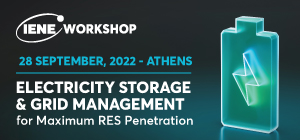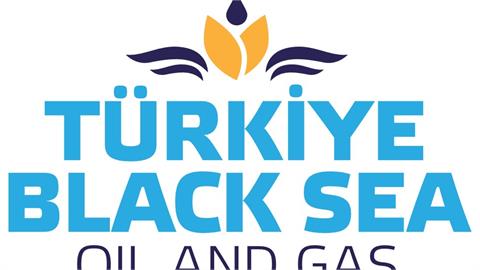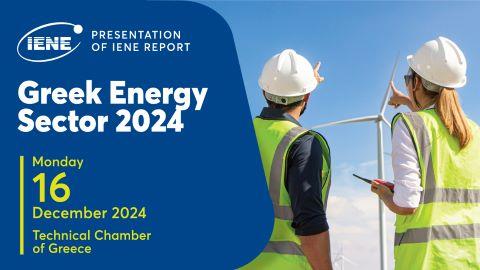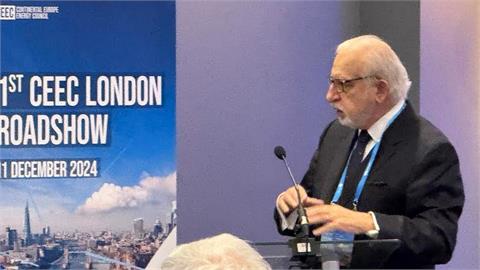The great expectations but also the challenges posed by energy storage were highlighted by the IENE one-day workshop entitled "Electricity Storage and Grid Management for Maximum RES Penetration" held in a central hotel in Athens on September 28.
The great expectations but also the challenges posed by energy storage were highlighted by the IENE one-day workshop entitled "Electricity Storage and Grid Management for Maximum RES Penetration" held in a central hotel in Athens on September 28.
The aim of the Workshop was to highlight the need for advanced energy management systems, which implies the application of large-scale RES, as well as to explore the related possibilities and challenges in a period in which the development of electrical energy storage systems revolutionized the field of RES. Leading experts and senior executives from Greece and abroad of the market participated in the workshop.
After opening remarks by the Chairman of IENE, Mr. Costis Stambolis, the workshop began with an introductory speech by Prof. Athanasios Dagoumas, President of RAE. Mr. Dagoumas referred in detail to the new legislative framework in Greece (law 4951/2022) regarding the licensing of RES and energy storage, as well as the position of the Authority regarding the new regulations. Among others, he described the current situation regarding licensing in the field of RES and storage but also the critical issues concerning the regulatory framework, which still remains to be settled between EU’s network regulators (e.g. the timing of the Energy Availability Requirement).
This was followed by a short presentation by Mr. Patrick Clerens, Secretary General of the European Association for storage of energy (EASE), based in Brussels, who emphasized, among others, that the energy storage sector is gaining more and more importance in the EU, as it is now considered the fourth pillar of the energy system after production, distribution and consumption.
In the first part of the workshop, in the discussion on the current situation in RES and energy storage as well as the auxiliary services and the future perspectives, Prof. Mr. Pantelis Capros, Chairman of IENE’s scientific committee and Director of the E3 MLab of NTUA, described in detail the findings of his recent study on the prospects for the development of renewable energy sources and energy storage for 2030 and 2050. As he noted, while wind capacity will stagnate by 2030, however, in the same period, the prospects of photovoltaics are great, which from 4.8 GW today, are expected to reach 15 GW by the end of the decade in Greece. Then Dr. Ioannis Kambouris, Chairman and CEO of the Southeast Electricity Network Coordination Center (SEENCC), spoke in detail on issues related to RES, energy storage and electrical interconnections in SE Europe. The coordinator of the first session was Mr. Costas Theophylaktos, Secretary General of the Institute and Chairman of the Energy Efficiency Committee of IENE.
In the second session of the workshop chaired by Vassilis Rallis, co-founder of EarthIndex, Dr. Gregory Smedley and Professor Keyue Smedley from the One Cycle Control company team, focused on Grid Management through Power electronics, carrying out a comprehensive analysis of what the power electronics are and how they are used by companies-suppliers of electricity but also by producers in order to achieve smooth conditions of injection of electricity into the network. At the same time, the role of power electronics for the optimal utilization of electrical energy storage systems was stressed as a means for maximizing the utilization of RES.
In the third session coordinated by Dr. Takis Haviaropoulos, Independent Energy Consultant, in which Mr. Stavros Papakostas, Professor of NTUA, and Ms. Youla Tsiknakou, Hydroelectric Projects Director of TERNA Energy, participated, the interest focused on pumped storage systems. During the discussion, the announcement about the construction schedule of TERNA's two important pumped storage projects, in Amari in Crete (90 MW) and in Amfilochia (680MW), captivated the participants attention, with the licensing process almost complete, and their construction underway (Amari) or is due to start within 2023 (Amfilochia). TERNA’s two major projects open the way for Greece to obtain much need storage capacity by 2023/2025.
In the sessions that followed, topics that covered the construction and applications of batteries, the design and construction of electrical networks with the aim for optimal utilization of RES systems and the specifications of large electrical energy storage systems in batteries, were examined. In the above sessions, contributions were made by the following participants: Dr. Platon Baltas, General Manager of Euditi Ltd, Dr. Dimitri Ottaviano, Director of Engineering and Product Development of Sunlight Group Energy Storage Systems, Ms. Ivana Krstic, Product marketing manager, Grid Operations Management League, of Schneider Electric from Serbia, Nikolaos – Antonios Livanos, founder and CEO of EMTech SPACE P.C., Prof. Chresten Træholt, Head of Section for Power-to-X and Storage, Technical University of Denmark, Dr. Stylianos Loumakis, Chairman of Hellenic Association of Photovoltaic Energy Producers (SPEF), Alexandros Anastasios Dalagiannis, Green Deal Initiative leader & System Application Engineer – Microgrid, of Schneider Electric and Stelios Psomas, Advisor of the Hellenic Photovoltaic Association (SEF).
The IENE workshop concluded with a large round table discussion and an overall examination of the issue of the workshop and realistic goals were formulated for storage system applications in the Greek market.
The lead sponsor of the workshop was One-Cycle Control and the event was sponsored by TERNA Energy, NANKO Renewables and Sunlight. Communication sponsors were the energy sites Energia.gr and Energypress.gr.




